Egypt is an amazing destination, filled with incredible history, architecture, food, and people. However, the reality is that you’ll likely come across scams during your trip to Egypt. We are pretty seasoned travelers at this point, having traveled to many destinations where travelers get scammed, but Egypt is definitely up there as one of the worst countries for it. This does not mean that you won’t have an amazing time—in fact, Egypt is one of our absolute favorite travel destinations!
However, we recommend doing some homework to understand what kind of scams you might come across in Egypt so that you can avoid them and enjoy a scam-free trip. So, if you’re heading to see the Pyramids in Cairo or do some scuba diving in the Red Sea, you should get familiar with these 10 common scams in Egypt!
10 Common Scams in Egypt
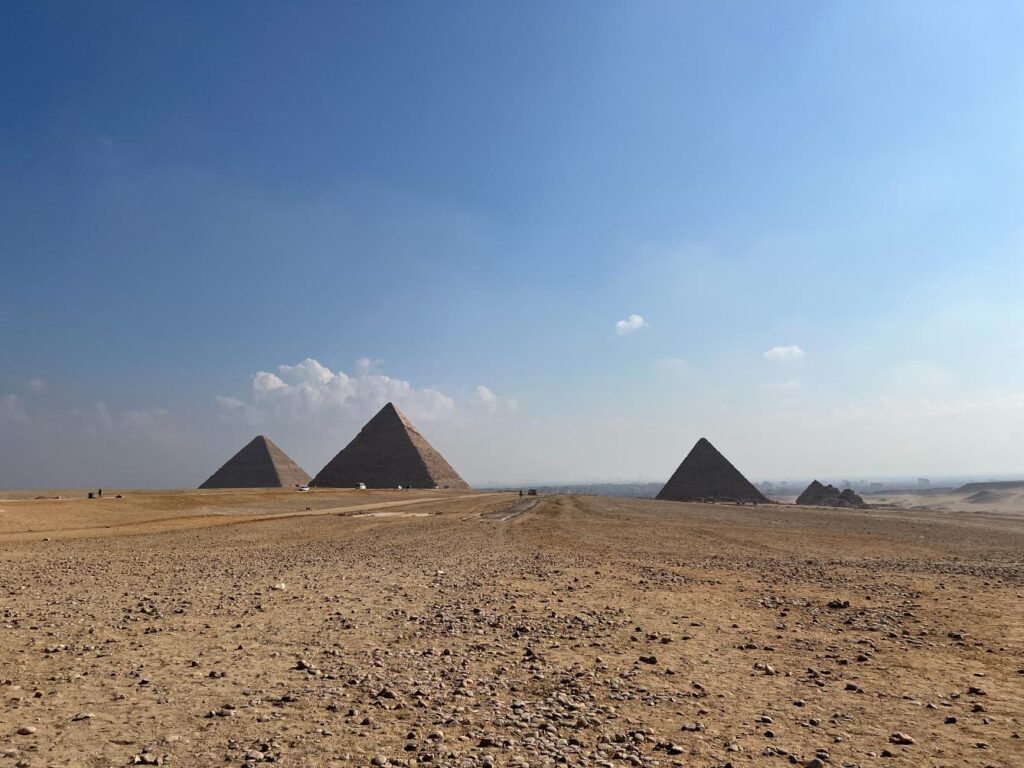
1. Uber Scam
The best way to get around Cairo is Uber. If you use Uber, you might pay slightly more than if you were to grab a taxi from the street, but you wouldn’t have to deal with haggling the price or navigating Google Maps to get to your destination if it’s not something that’s well known.
However, one scam we commonly encountered during our time in Egypt has to do with Uber. Oftentimes, a driver would pick up our ride. But when they arrived, they would ask for us to cancel the ride and pay for the ride off-platform in cash even though the payment was through the app.
How to avoid it: Always insist on using the Uber app for payment. If a driver asks you to cancel and pay cash, refuse and report them in the app. If they cancel, just request another ride. And if they refuse the cancel, making you pay a cancellation fee, just refute it via the Uber app. You’ll get a refund in a matter of hours.
Check out our ultimate travel guide for Cairo for more recommendations.
2. Hotel Scam
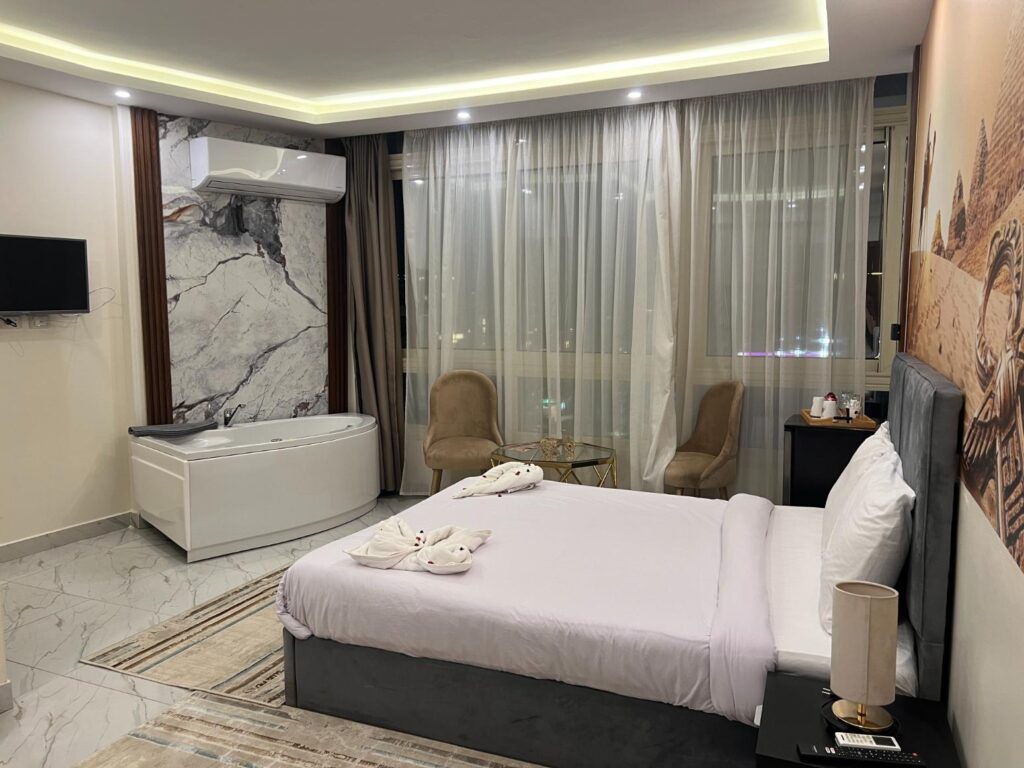
The unfortunate reality of some travelers is arriving at their hotel only to be told it’s fully booked, closed, or under renovation. Yikes. The hotel staff will then offer to transfer them to a different property, which is typically lower quality and nothing like the hotel you originally booked.
Another common hotel scam in Egypt involves being put into a completely different room than you booked.
How to avoid it: Book through reputable platforms like Booking.com or Expedia and read reviews carefully. Try to avoid newer hotels and stay at ones with a good reputation.
3. Fake Tour Guide
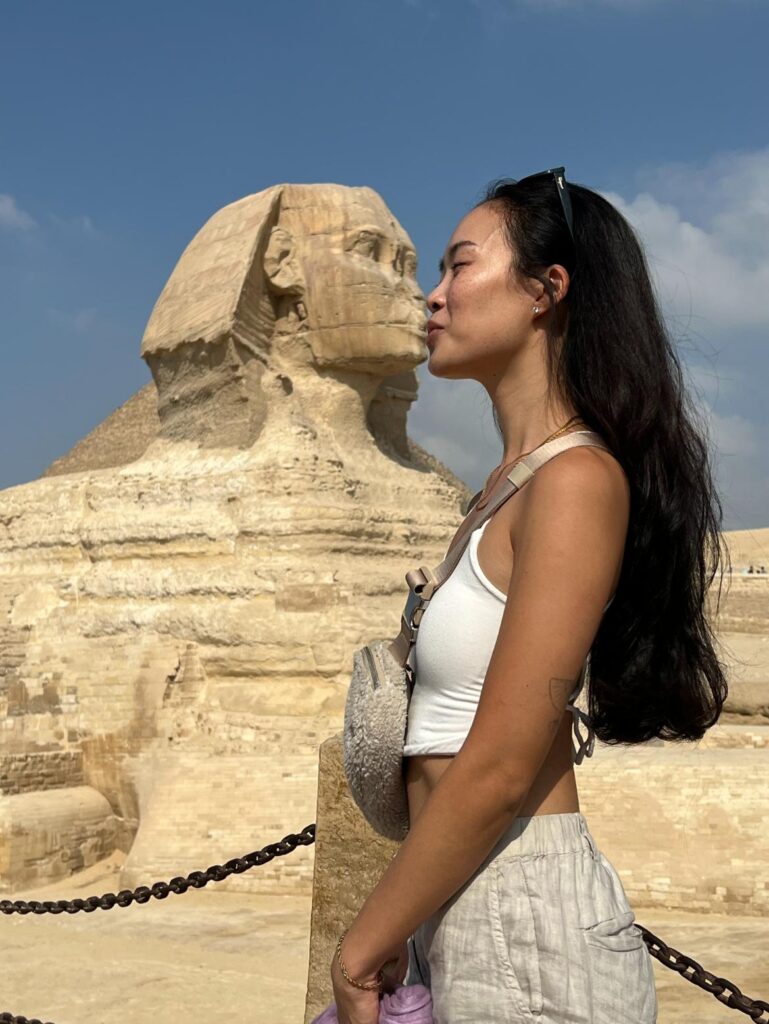
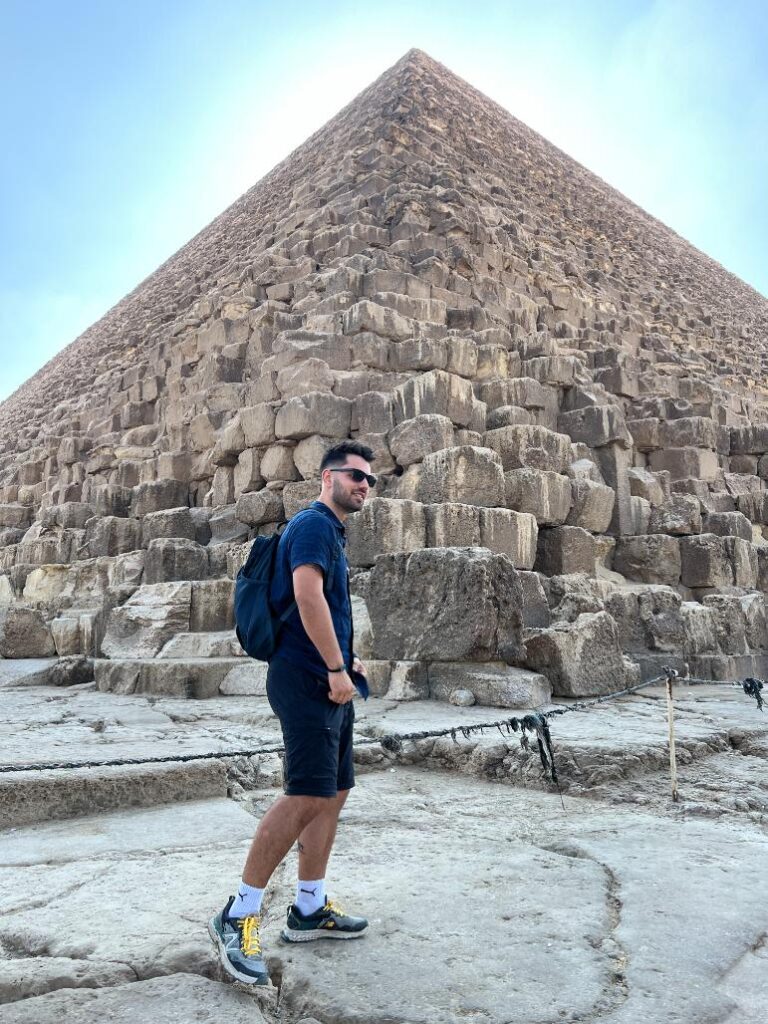
At famous landmarks, you may be approached by someone claiming to be an official tour guide. They’ll start giving you a tour without asking, then demand a tip at the end. During this unsolicited tour, they may even take you to certain souvenir shops that will have sales techniques that pressure you to buy so that they can get a commission.
How to avoid it: Always book guided tours in advance. If someone approaches you at a site, politely decline their services with a firm, “No, thank you.” We booked a full-day tour of the Pyramids and some surrounding ancient sites and can’t recommend it enough!
4. Camel Ride Scams
Taking a camel ride at the Pyramids of Giza is a must for many tourists, but be careful! Some camel owners in Egypt will scam tourists by advertising “cheap” rides and then refuse to let you down until you pay more than your original agreement. Others will claim the price was “per minute”, “per step”, or “per person”, even though they hadn’t said so when you first got on the camel.
How to avoid it: Always agree on a price beforehand and confirm it’s for the whole ride, not per minute. But the best way to avoid this scam? Book the camel rides through your tour guide (if applicable) or your hotel. Better yet—don’t ride camels at all, as the camels in Egypt appeared pretty maltreated.
5. Overcharging at Restaurants
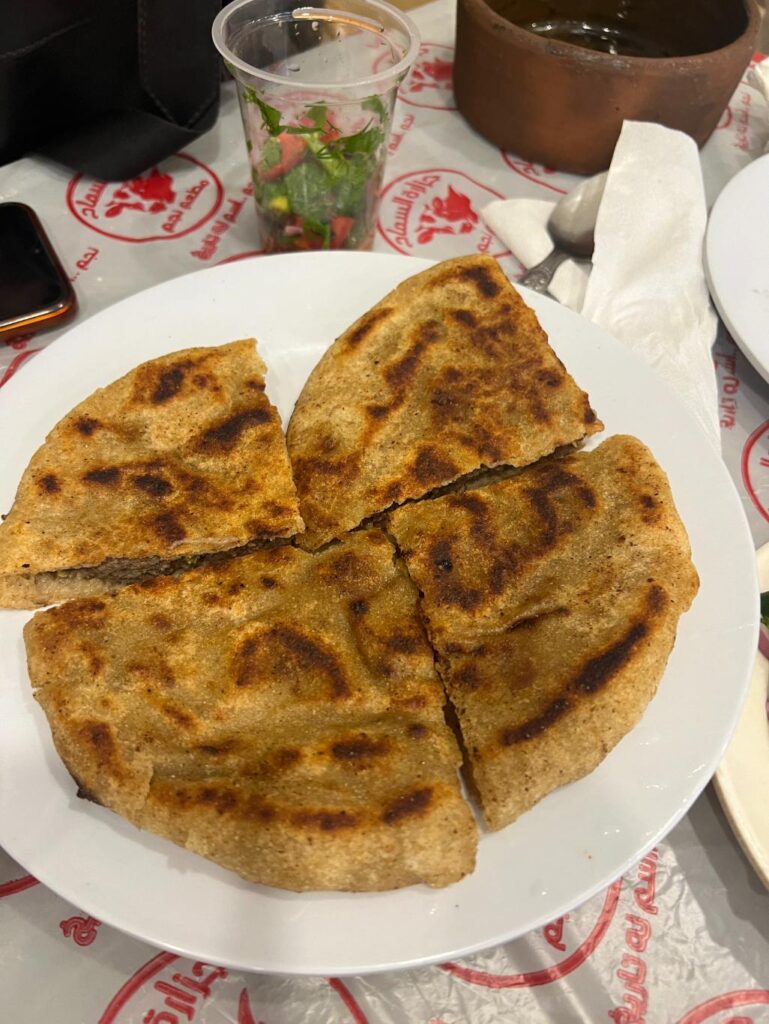

Some restaurants inflate prices for tourists. In many cases, tourists may show up at restaurants and ask to be seated before seeing the menu. The “menu” is oftentimes verbal or simply doesn’t have a price next to the menu items. Then, after eating, tourists will be left with a massive bill that is much higher than expected.
Another variation of this scam involves switching menus after you order. Staff may initially show you a menu with reasonable prices, then present a different menu with inflated prices when it’s time to pay. Some restaurants also add hidden fees like excessive “service charges” or “tourist taxes” that weren’t mentioned beforehand.
How to avoid it: Check the menu before ordering and take photos of it. And always ask for the price beforehand so that you know exactly how much everything costs. Also, make sure to always look for highly rated restaurants with plenty of reviews. We even specifically look for restaurants with recent positive reviews from other tourists.
6. Photo Scams
If you have your phone out, ready to take a picture of a monument or a selfie with said monument, brace yourself. Locals may offer to take your photo. But don’t mistake this as kindness. Most will take photos and then demand payment afterward. Another similar scam you might come across? Someone may place an item (such as a scarf or hat) on you as a prop for a photo and then demand payment for the item.
How to avoid it: Take your own photos or ask fellow tourists to help. If someone offers to take your picture, politely decline.
7. “Hidden” Areas at Major Attractions
Another common scam in Egypt occurs at famous landmarks. A local may approach you, telling you they know a “secret” spot, and offer to take you there. Once you follow them to this “secret” spot, which is often disappointing in and of itself, they’ll demand a tip or payment before letting you leave. In some cases the local will be dressed in a fake uniform to make you think they are a tour guide or work at the tourist attraction.
How to avoid it: Stick to official paths and avoid wandering into secluded areas with strangers. If someone insists on showing you a hidden spot, firmly decline.
8. Fake Tickets
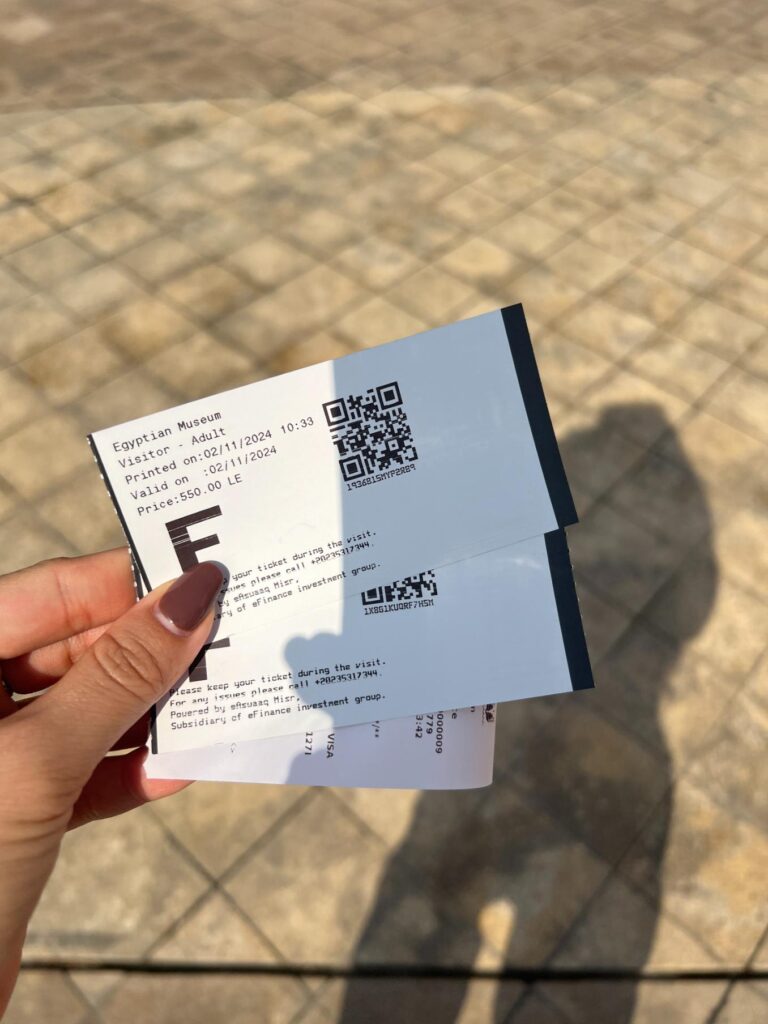
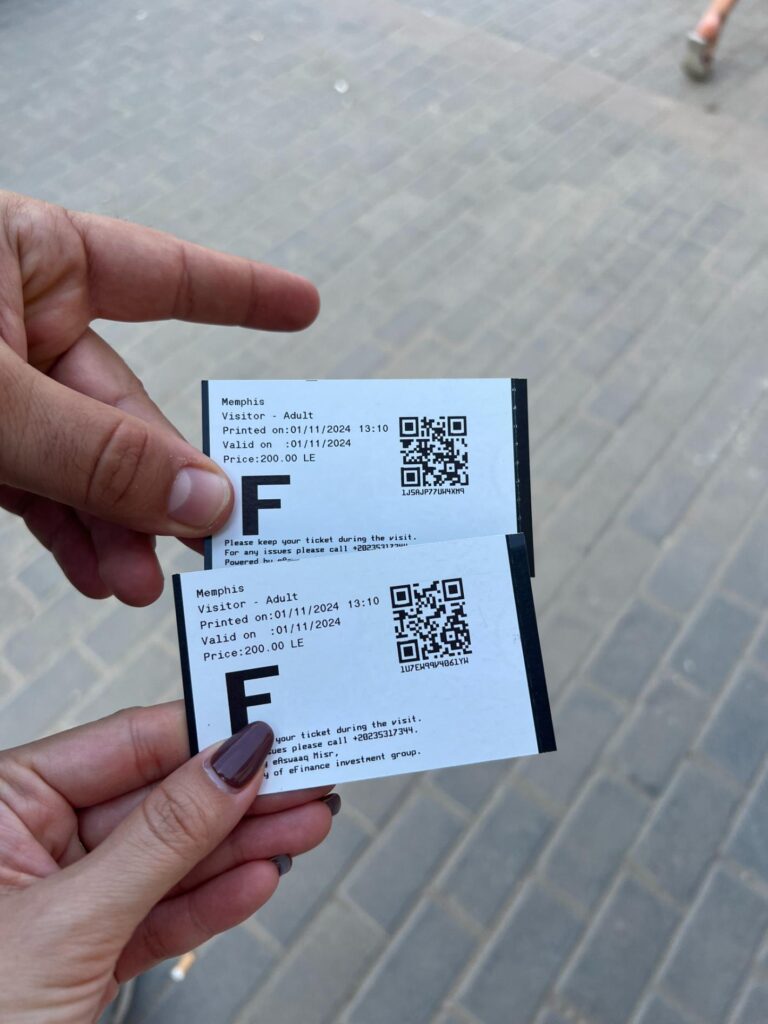
This is a biggie. When you’re in front of and outside a major attraction, make sure you know exactly where you’re going. Scammers often sell fake tickets right outside of these attractions, with some even dressed as staff or security.
How to avoid it: Make sure to ONLY buy tickets from official booths or websites. If someone insists on an extra fee, verify with an actual staff member inside the attraction.
9. Grocery Items without Display Prices
In local markets and small shops, some vendors won’t display prices. This means they’ll often charge whatever they want, quoting prices that are much higher than the norm if they suspect you don’t know how much goods are supposed to cost.
How to avoid it: Shop at stores with clearly marked prices. In fact, as a top tip, shop at a store with marked prices first to gauge how much items should cost before attempting the smaller local stores, which shouldn’t be charging too much more than what you pay at the supermarket. If a price seems too high, shop elsewhere.
10. Fake Police
This might sound crazy, but it’s true—some people may impersonate police officers, stopping tourists and claiming they need to check documents. Then, they may take your money or demand a bribe.
This happened to us on the way to the Blue Lagoon from Dahab!
How to avoid it: Real police officers will always be in uniform and won’t randomly check your wallet. If you’re approached by someone claiming to be police, ask to see their ID or insist on speaking at a police station.
🛑 WAIT! Don’t forget insurance!
SafetyWing’s Nomad Insurance is a travel medical insurance for nomads by nomads. You can sign up for as little as $2 a day to cover your travel and medical needs while on the go ✈️🌏
More Tips to Avoid Getting Scammed in Egypt
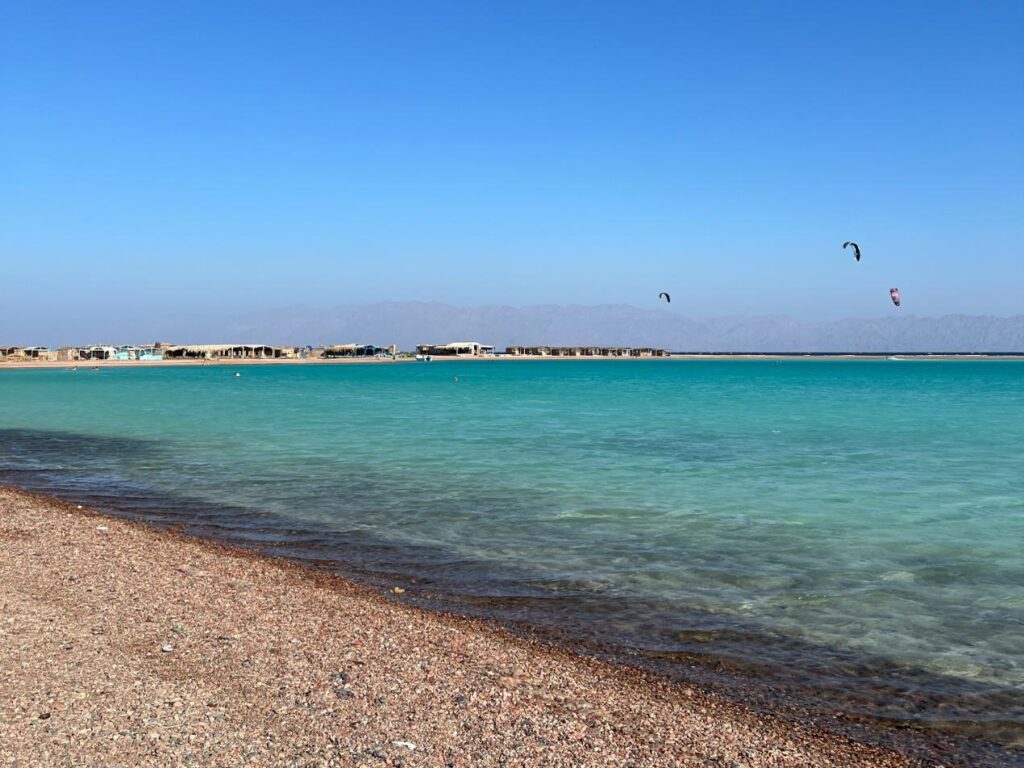
Beyond simply knowing the common scams you might come across during your time in Egypt, it’s helpful to know how to avoid getting scammed. So, here are our handy tips you’ve got to know.
Understand Egypt’s Tipping Culture
Tipping, or “baksheesh,” is a part of life in Egypt. You should always carry around small bills exactly for this reason. Many people you interact with throughout the day may expect a tip for their services, including hotel staff, someone helping you with your bags, or even someone simply giving you directions. So, don’t be surprised if whenever someone helps you in some small way, they ask for a tip afterward. This is completely normal!
However, if you feel pressured to tip when someone hasn’t actually helped you, be firm when telling them, “No.”
Don’t Accept Unwanted Assistance
On a similar note, if you don’t want to tip, don’t accept unwanted help. Friendly strangers might offer to help you cross the street, take you to a tourist attraction, or take your photo (as mentioned above). Know that if someone offers you “help” in either way, you are expected to tip, which is completely fine if you welcome the help.
But if you don’t need help or simply don’t want to tip, a polite but firm refusal can go a long way.
Determine a Price You Are Willing to Pay
Our advice when shopping in Egypt? Decide how much you are willing to pay for an item before you begin negotiating. This goes for clothes, souvenirs, and other goods and services you have to barter for.
When you first ask a vendor for a price, they’ll start with an inflated price. Then, you start the game of throwing numbers back and forth until you and the vendor agree on a final price somewhere in the middle. To avoid getting overcharged too much or paying more than you would like to for a particular item or service, always decide what you think is a fair price beforehand, and don’t get sidetracked.
Always Ask for the Price Beforehand
A common scam we witnessed in Egypt is hidden prices. Sometimes, vendors may not have the price of their goods and services written down on a menu. If you can’t see the price, always ask beforehand.
This goes for restaurants too. Quite a few restaurants we went to in Cairo, in particular, did not have any written prices or menu items. And since it can get quite chaotic, we’ve seen tourists not ask the price beforehand, only to be charged an exorbitant amount for the food they ate, which they are then forced to pay.
So, always confirm the price before agreeing to anything, and don’t be afraid to walk away if it seems unreasonable.
Don’t Give Money to Child Beggars
One of the hardest things we experienced in Egypt was witnessing children asking for money. Yes, this is completely heartbreaking, and it’s easy to give them a few Egyptian pounds and call it a day. However, these children are often part of an organized crime that takes advantage of these children. The unfortunate reality is that giving money only encourages this system. If you really want to help, donate to a local charity that supports children in need. While you won’t really see much of this on the Red Sea in areas like Dahab, it is very common in Cairo.
Be Wary of Papyrus and Essential Oil “Museums”
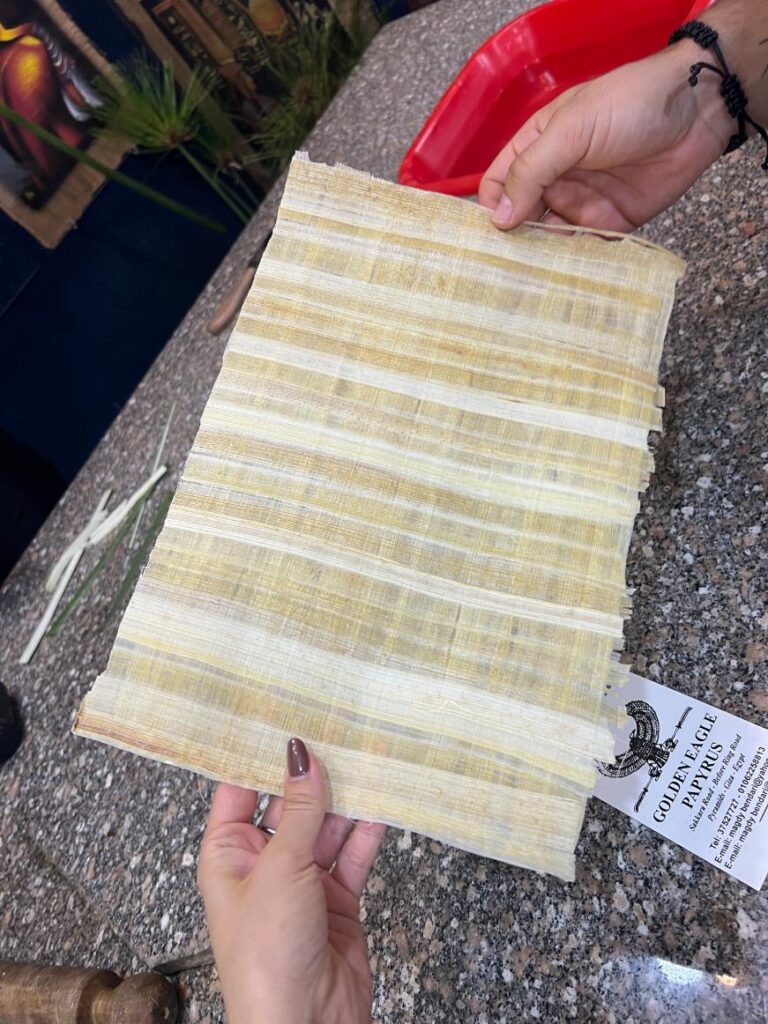
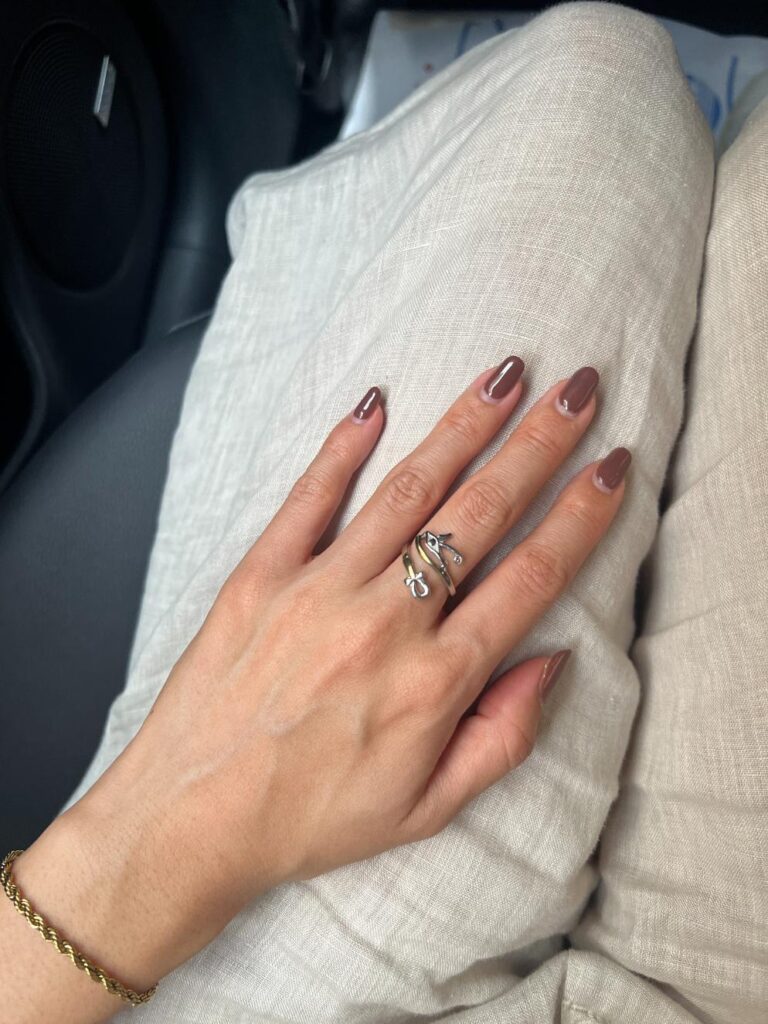
Some shops pose as “museums” to lure in tourists. They’ll give you a free tour, maybe even a demonstration, and then hit you with high-pressure sales tactics, which can be pretty stressful. If you want to buy papyrus art or essential oils, research reputable stores beforehand to avoid paying way too much for low-quality products.
Many of the all-day pyramids tours you’ll do will include a stop at one of these “museums”. If you can, ask if you can bypass these museums during your tour altogether, especially if you’re paying for a private tour.
Don’t Buy Souvenirs at Tourist Sites
This is a tip that goes for basically any major tourist destination. But vendors near the major tourist attractions, such as the Pyramids of Giza or Luxor Temple will charge ridiculously high prices for the same item you can get elsewhere for just a fraction of the price. So, shop away from these major tourist hotspots. And again, don’t forget to haggle!
Beware of Overly Pushy Salesmen
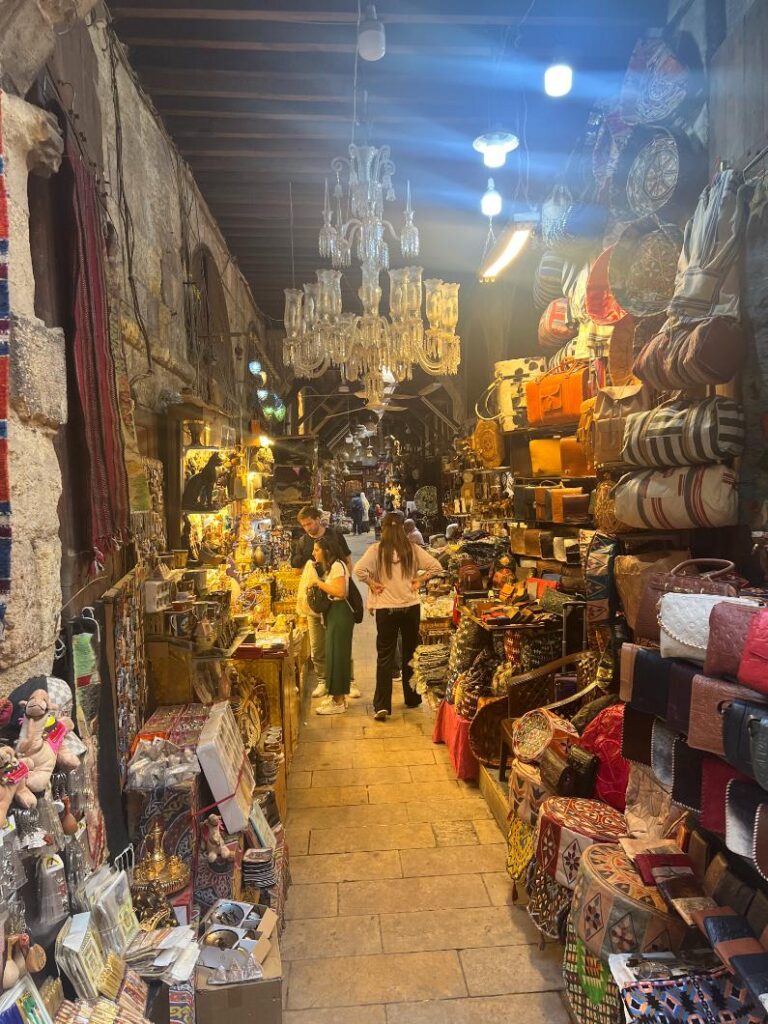
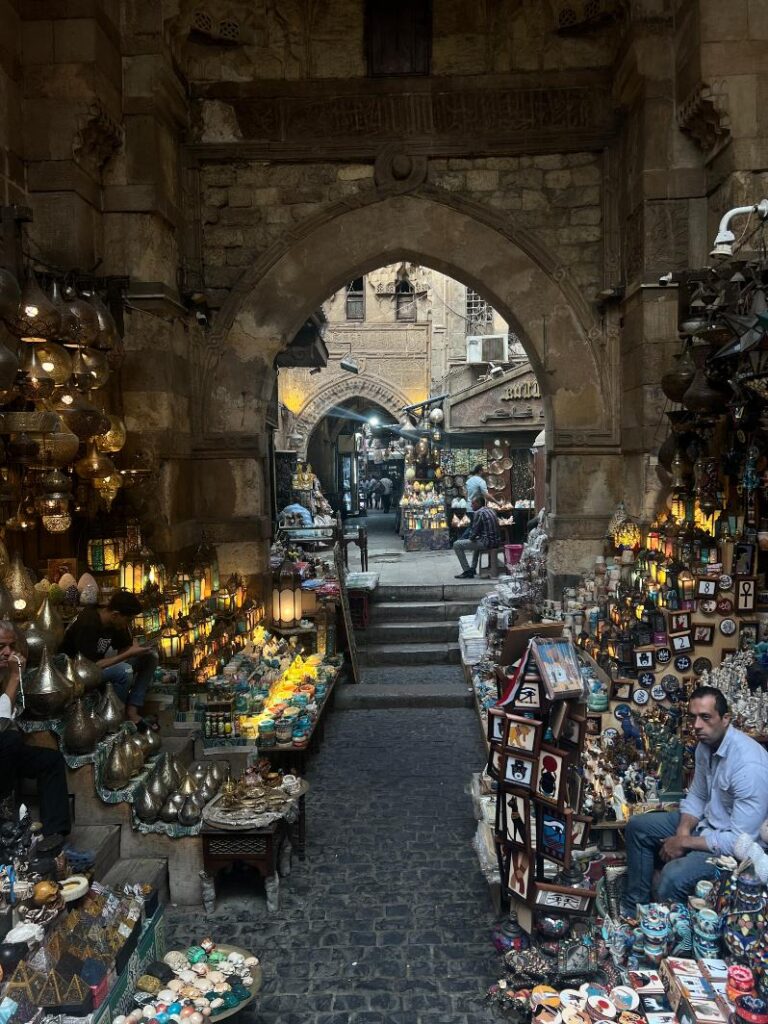
Egyptians are very hospitable and friendly, but some of the vendors can be very pushy. If a shopkeeper won’t stop following you around and won’t take no for an answer, don’t feel guilty about walking away and ignoring them completely. Sometimes, a “no” will only get you so far in terms of getting them to back off.
Say “La Shoukran”
If you remember just one phrase in Arabic, let it be: “La shoukran” (pronounced: La SHO-kran). This is Arabic for “No, thank you”. This simple response works wonders for turning down persistent vendors, unwanted help, or anyone trying to rope you into any of the scams above. Say it confidently, and keep it moving.
Get Help From the Tourist Police
There’s an entire police force dedicated to helping tourists. So, if you are having any sort of trouble from an insistent scammer or you feel unsafe at any point, threaten that you’ll be calling the tourist police (dial 126) or approach one if you’re near a tourist attraction.
Remember to Be Kind
Yes, Egypt has scams. And, of course, you should stay cautious. But don’t let all your scam worries make you overly suspicious and on edge the entire time! This will only ruin your trip and stop you from making connections with some of the warmest, friendliest, and most welcoming locals we’ve ever met! Not everyone is a scammer, so stay polite, trust your instincts, and enjoy everything this amazing country has to offer! We spent an entire month in Egypt as digital nomads and can safely say that while scams certainly exist, the vast majority of Egyptians are incredibly kind.
Travel in the Off Season
Being such a major hub for tourism, Egypt doesn’t have an “off-season” like most other places. That said, if you visit Egypt outside of the peak tourist months, you’ll likely experience far less hassling and scams. The off-season is between May and September, but keep in mind that it gets EXTREMELY hot during these months. So, while places like Cairo may be unbearable, the Red Sea areas will likely be much more manageable. When possible, we always try to visit destinations in the off-season as it’s a more sustainable way to travel and generally more enjoyable!
Be Safe When Traveling Egypt!
Egypt has a reputation for being an intense place to travel, and it definitely can be overwhelming. While you may encounter scams here, this doesn’t have to make or break your trip. With some preparation, you’ll be able to navigate these scams and culture shocks like a travel pro. That way, you can spend your time in Egypt actually enjoying the sights and history instead of looking over your shoulder every two seconds. A little knowledge goes a long way!




